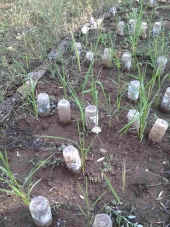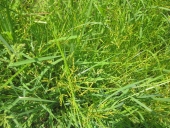posted 14 years ago
So, I was thinking about my rice. We plant it after the second good storm of the year, about mid May. By September it's harvested, but if we didn't, I guess it would reseed itself, and be ripe by January. Too bad rice needs a lot of water and here it stops raining by December at the latest. Possibly the stalks from the previous generation would keep the moisture as living (well, dying) mulch?
Then I guess it would reseed itself in January and stay dormant until the first rains in May?
It must be like that. Just trying to figure out how to have agriculture imitate nature. I couldn't quite understand the gap between september and may, without human intenvention. I was also thinking of Fukuoka planting rice at the time when it would naturally occur, which would have me plant rice in September and hope during the last two months that the mulch does its job (which is what Fukuoka counts on, having 25 years of decaying clover). It would actually work great because now we harvest in September when it's the rainiest and it's a pain to dry the rice in the sun and even just find a sunny day to harvest!
Also, in nature seeds are cast off in excess just to cope with any eventuality, whereas in agriculture there is more control and we tend to want 100% yield from each seed planted.
OK, so I guess I answered my first question. I rock.
Second wondering of mine, in agriculture we rotate the crops for all those reasons we know, but in nature, I was looking at my mung beans, and thinking that if we didn't intervene, only more mung beans would grow in the same area, making it bigger, or shifting maybe a little bit in one direction. And that would happen with just about any plant. I guess the key again is that in agriculture we harvest and just clear everything, whereas in nature, stuff grows out of the corpses of its previous generation. In the case of the mung beans, they would sprout mulched by the stalks of their parents that contain the very nutrients a mung bean needs to grow and they won't even have to extract them from the soil.
Wow, not like I had to be convinced about the importance of mulch, but this is really interesting to keep in mind.
Am I correct in all this?
Writing from Madhuvan, a yoga retreat/organic farm on the West Coast of Costa Rica.









